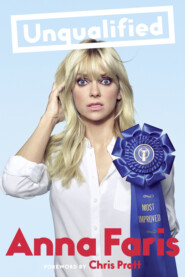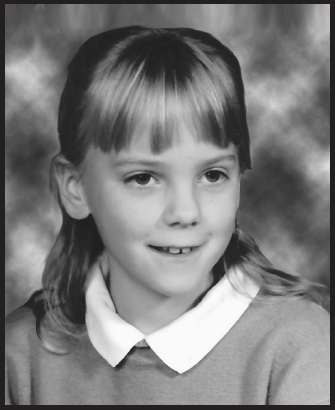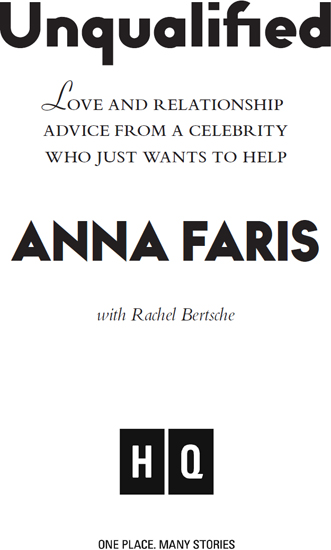
Полная версия:
Unqualified

ANNA FARIS is an actress, producer, and top-rated podcaster: Her podcast, Anna Faris is Unqualified, averages four million downloads a month. Faris currently stars on the CBS hit comedy Mom and has had memorable roles on Entourage and Friends. She will next star in MGM/Pantelion Film’s remake of Overboard alongside Eugenio Derbez. Faris produced and starred in The House Bunny and What’s Your Number?, and her additional films include the Scary Movie franchise, Lost in Translation, The Dictator, Observe and Report, Brokeback Mountain, Just Friends, Smiley Face, Keanu, and the Cloudy With a Chance of Meatballs franchise. A native of Washington State, she lives in Los Angeles with her family.


To Chris.
Your wisdom and strength have made me a better person.
CONTENTS
Cover
About the Author
Title Page
Dedication









































Acknowledgments
Copyright
FORWARD
By Chris Pratt
When I was asked to write the forward for Unqualified, Anna’s memoir, I immediately said yes without even thinking about it. And boy did a lot happen between then and now.
So much.
Like … soooo much.
So. Allow me to start by asking some questions:
First and foremost: What is a forward? Like, you know? What is it? Is a forward an anecdote? Like that time Anna and I went to the Beverly Hills library and I told her it was the first time I’d ever been in a library and then she looked at me like I must be joking? And I pretended I was joking? And boy did we laugh. But I wasn’t joking? Is that a forward?
I don’t really read books all that much. I mean, I know how to read, as in sounding out words and phrases, sentences, and the like. I can spell, too! I’ll stop now. I feel like I’m bragging. But let’s just say books aren’t really my specialty. Per se.
I do read a lot of screenplays.
May I paint you a forward in screenplay format?
Fade in.
Int. Bedroom. Night. Chris Pratt (early twenties, roguishly handsome) stares blankly at his phone. He blinks a couple of times.
Chris: Siri. How do you write a forward? Siri: Searching: How to go right and forward. Chris: NO, STUPID! Siri. What is the definition of forward? Siri: Searching: What is the definition of forewarn? Chris: NO! Siri! Give me FORWARD definition. Siri: Searching: Give me forearm definition. Chris: Umm … Yeah. Show me that.Distracted, Chris begins watching forearm workout videos for several hours.
Fade out.
Credits roll.
Thunderous applause. Oscar nom Best Short Film. #blessed
Okay … Back to it.
Crickets.
Stares at phone.
Literally googles the word forward.
Wow … Okay. So … it’s actually spelled FOREWORD. With an O and an E. Who knew? Siri did. Of course. We’ve been through a lot, she and I.
Anyhow, lesson learned. Now, let’s move FOREWORD and discuss someone else with whom I’ve been through a lot.
My Foreword
By Chris Pratt
Anna is an important part of my life and she always will be. She asked me to write this foreword. And I’m doing so because I love and respect her and told her I would.
She and I have a striking number of similarities.
We were both raised in Washington State, just twenty minutes from each other. (Coincidentally, we didn’t meet until working together in LA.) I played football on her high school field, a fact I’ve pointed out every single time we’ve driven past that school in ten years, to which, every time, she reacts with a gracious amount of faux wonder, kind sweetheart. We’re both actors who made it in Hollywood, being cast as intelligently played idiots: me, Andy Dwyer; her, Cindy Campbell. We both have scars on our left hands, the results of drunken accidents that left us with nerve damage. We each had dead-bug collections before meeting. And even though they’re not the same, Linda Goodman, author of Love Signs, claims our astrological signs are the most compatible with each other.
But there are a few differences as well. For one: Anna is a voracious information collector. She reads, hears, watches, and retains an inordinate amount of stories—from podcasts and NPR pieces to New Yorker articles. She’ll often pore over the newspaper while simultaneously watching a TV show and blow drying her hair. She reads the big five: The New York Times, LA Times, The Seattle Times, The New Yorker, and The Economist. Whereas I read “The Big 5” sporting goods ads, looking for good deals on guns and Rollerblades.
Anna is kind, possibly to a fault. I’m proud to say we each approach most human interactions with politeness, and patience when required. We’re both well-known actors, and it’s worth mentioning—fame can be a pain in the butt. But we’re thick-skinned. And despite what it may seem, we’ll be just fine regardless of what you think of us. She’s been in the spotlight longer than me yet continues to be the voice of reason in uncomfortable situations regarding our lack of anonymity. When approached by fans and photographers, she smiles and shows kindness. As do I, although my annoyance and bubbling anger with paparazzi tend to be more thinly veiled.
Anna is graceful with strangers and fans because she is actually wildly interested in every person she meets. She asks great questions. She communes with anybody and makes an instant connection with each person she meets, which lasts … a VERY SHORT TIME. Like a “goldfish, three seconds, turn around and you’re strangers” kind of way? Almost like Dory from Finding Nemo? Or the movie Memento? And that person, that nameless, forgotten person, knowing full well the moment is over, still somehow walks away feeling charmed and deeper in love than before. That’s just how intoxicating she is.
Being TV and film stars, we live a circus lifestyle, pulled this way and that by jobs, strangers, lives on the road, all in service of the crowd. I see it as a calling in terms of the platform I’ve been given and a job that keeps me from breaking my back doing construction. For Anna, acting is a passion. She simply loves it. More than maybe anyone I know. There are home videos of her playing made-up characters from as early as eight years old. She started younger than that and really hasn’t stopped since. On set and off she is constantly slipping into character, often her go-to clown: the awful party girl you may have seen in Just Friends (perhaps the greatest supporting role in a comedy by anyone ever—no hyperbole), as well as many more with our son. She lives to entertain.
And finally, more than anything, Anna deserves this book. I can promise you it will be a great and interesting read. A face-first dive into the mind and person that I spent one amazing decade with, and will, for the rest of my life, amicably coparent a human. She is the amazing, effervescent, former short girl, theater nerd, camp counselor, crossing guard, headgear-wearing, feistmeister, character-playing Anna Kay Faris, the “I was such a late bloomer I had to actually learn social skills to survive and developed wit to get by and then turned hot later” fan of Real Housewives, good times, extravagance, prudence, herself, her family, podcasts, books, white guilt, neurosis, great foods, repeated deep musical moments, mornings with the newspaper, small bites, feminism, and more.
And in all the years we were together, I don’t think I smelled her farts once. They’re probably not too bad.
Enjoy.
Introduction
I Rote a Book!
I’m not qualified to write a book.
I might as well have woken up one morning and thought, What can I do today that I have no experience doing, that I’m sure to make an ass out of myself while doing, and that will test a population’s patience with my mental ability? Rite a book! So I called my agent and got a book deal. Bingo, bango! Anyone can do this!
Truthfully, though, I’m terrified. I should have done a better job of thinking this through. You know how the biggest decisions in your life never appear as the lightbulb flashes you see in cartoons but instead germinate in the deepest crevasse in your brain and slowly take root until suddenly a blossom emerges in the forefront? That’s pretty much what writing a book was for me. An idea I toyed with now and then, which eventually became more now than then, and suddenly I was pursuing literary agents and, before I had a chance to come to my senses, I was documenting my life (or at least my life in relationships) in writing.
As my mom keeps reminding me, I do have a degree in English from the University of Washington, a school that after five long, hard years taught me that I am unpleasant to be around after smoking weed out of a four-foot bong. But I don’t think anyone, in my seventeen years of living in Hollywood, has ever actually asked me about my education. That’s kind of the beauty (or horror?) of LA. No one gives a shit about any credit outside “the industry.” So writing a book seemed like a fun, exploratory journey into the literary world, and a nice way to flex those English-major muscles.
But now the train has left the station and I feel as though I’m bound to disappoint many people in my life, including you, dear reader. I’m an actor, and have been since I was nine, so I should point out that I have been hiding behind characters and other people’s words for a long time. There is always an out. Writing a book and putting my own words into the world is terrifying in the very way that performing in front of a camera will never be. In 2011, I naively and arrogantly agreed to be the subject of a profile in the New Yorker. It was written over the course of six months and when the fact-checker called me a few weeks before publication to read my own words back to me—words that I had spoken and completely forgotten—I knew I had to leave the country for good. My own vanity was about to destroy all I had worked for in Hollywood. Ultimately that didn’t happen, but I did have to make a couple of apologetic phone calls.
Other small points of concern: I haven’t used a computer properly ever, in my entire life. When you have a job where you make faces and say other people’s words, you don’t have to learn technology. Sometimes you don’t even have to learn how to dress yourself, ’cause nice Lara is there to zip you up. So anyone at your neighborhood nursing home is more qualified to be punching these little buttons on this here keypad.
In fact, I think I might even have a typo in the title of this chapter.
Also, I don’t know why I can’t nap. I know that’s not related, but it sort of is in that I want you to know everything about me, dear reader. You and I will be best friends after all this is over. I would like it if you would send me your autobiography, too.
Oh, and I’m really bad at social media. Why do I need to record everything online? Can’t I just keep it in my brain? But I’m told that it’s necessary to sell a book these days.
So, just so we understand each other, I don’t know what the fuck I’m doing.
That’s never stopped me before, though. Actually, that’s not true. Until I was nineteen, I thought I was supposed to know everything. I didn’t, obviously, but I accepted that there was a universal understanding that we all faked it, and the polite thing to do was quietly continue the charade. I knew to lay low and keep quiet so I wouldn’t get made fun of. Then one day during my sophomore year at UW, I was sitting in the back of Intro to Something (Psychology? Sociology? I can’t remember. I was miserable at the beginning of college. I sat in the back of giant lecture halls writing letters to Dustin, the “just a friend” I was in love with, who was studying abroad in Spain), when this good-looking fraternity guy raised his hand. I don’t know what the professor was even talking about, just that the dude with his hand up said, “I don’t know what that means.” I remember a record scratch in my head: Somebody just confessed they didn’t know something? There was so much bluster—everyone was always pretending they had all the answers. So it came as a shock to me that it was okay for someone—especially a hot frat type—to say, “Yeah, I don’t know what you’re talking about. Maybe you’re all going to think I’m stupid, and maybe I am, but I don’t understand.”
There’s liberation in admitting you don’t know what you’re doing. For me, it took years of comedy acting to get there. When you’re shooting a film like Scary Movie you have to constantly confess that you have no idea if something is going to work, and it turns out it feels good to say, “I don’t know how to do this.”
So let me say it again: I have zero qualifications, and no one should be listening to me.
And yet, I want to help you with your love life. I do. I have advice to share—who you should date, who you absolutely shouldn’t—and some cautionary tales, too. Plus, I’m fascinated by other people’s relationships. In fact, I’m fascinated by other people’s lives. What they ate for dinner, who they slept with last night; it’s all equally interesting to me. And while I don’t like to butt in, I do love to offer helpful, if sometimes unsolicited, wisdom. (That’s butting in, isn’t it? I’m the worst. I’m a horrible person.)
I’ve been doling out romantic advice my whole life. Most recently, and most publicly, on Anna Faris Is Unqualified, the podcast I cohost with my friend Sim Sarna, but my penchant for digging into other people’s personal lives started decades ago. When I was eleven, my mom’s friend came over to our house, sobbing. She was ranting about how awful her husband was, and I eavesdropped until I couldn’t stand it anymore. “You have to leave him!” I butted in. She had two kids, but who cared? Kids, shmids. I was passionate about this. It was the only logical solution. She could run away and start a new life! She should totally leave him! Why didn’t she just leave him?! It would be so easy! JUST LEAVE HIM!! When she didn’t—because, of course she didn’t, because life is complicated—I was profoundly disappointed.
My craving for a relationship of my own started before I played therapist to my mother’s friend. For as long as I can remember, I wanted a boyfriend so, so badly. My mother, a ferocious feminist, couldn’t stand how boy crazy I was. She hated Pretty Woman and didn’t let me watch Grease because she disapproved of how Sandy changed herself for Danny in the end. She was adamant that I never be dependent on a man, and it created a massive inner conflict in me. I knew I wasn’t supposed to long for a boyfriend as much as I did, which just made me want one more. I’d stay up late reading Sweet Valley High books, and even though I knew they were kind of stupid, I got off on the drama. The idea of boys fighting over me made me dizzy, probably because no one ever did. I bribed Jason Sprott, the fastest boy in the third grade, with ice cream just to get him to talk to me.
In the absence of a relationship of my own, I lived through other people’s. I read Dear Abby and listened to Dr. Joyce Brothers and watched Sally Jesse Raphael. I did theater work around Seattle and was riveted when the lead actress flirted with the hot set dude. I wanted so intensely to be grown up, because to me, the defining feature of adulthood was getting to be in love.
When I was seventeen, I started dating my first official boyfriend, Chad Burke. He was unbelievably good-looking, but also, shall we say, “dark.” Chad was popular, thanks to his looks, but he was also cynical and angry and would sneak out at night to write Rage Against the Machine lyrics on the telephone poles in our town. I couldn’t believe that someone that hot would like me, and I was young, so I would have done anything for him. We went out for a year, and, like Felicity, I followed him to college. Two weeks after the school year began I would call his fraternity and he wouldn’t come to the phone. I got drunk and went to his frat house and they wouldn’t let me see him. Eventually we ran into each other and Chad told me he was dumping me. Clearly, I didn’t have as much of a handle on the whole dating thing as I thought I did.



